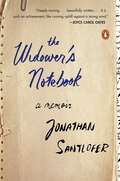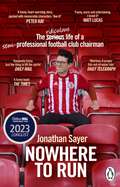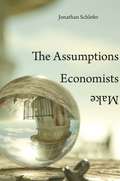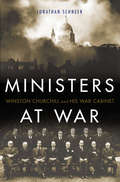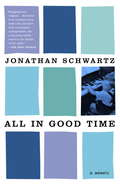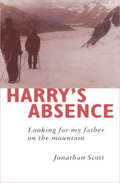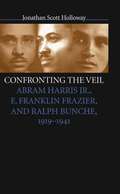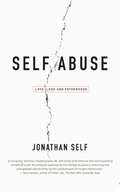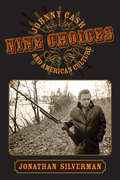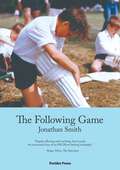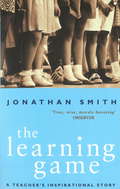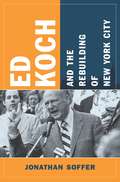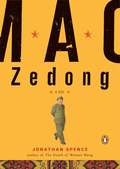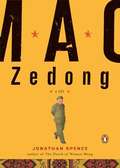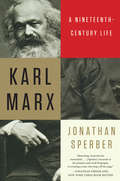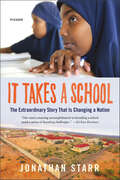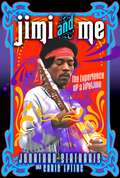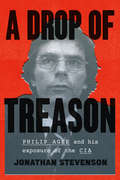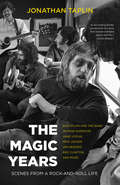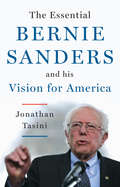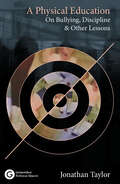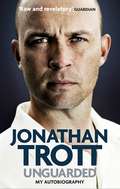- Table View
- List View
The Widower's Notebook: A Memoir
by Jonathan SantloferWritten with unexpected humor and great warmth, The Widower's Notebook is a portrait of a marriage, an account of the complexities of finding oneself single again after losing your spouse, and a story of the enduring power of familial love."This is deeply moving ... beautifully written and modulated, with a dollop of droll, black humor. It is such an achievement, like running uphill against a strong wind."--Joyce Carol OatesOn a summer day in New York Jonathan Santlofer discovers his wife, Joy, gasping for breath on their living room couch. After a frenzied 911 call, an ambulance race across Manhattan, and hours pacing in a hospital waiting room, a doctor finally delivers the fateful news. Consumed by grief, Jonathan desperately tries to pursue life as he always had--writing, social engagements, and working on his art--but finds it nearly impossible to admit his deep feelings of loss to anyone, not even his to beloved daughter, Doria, or to himself. As Jonathan grieves and heals, he tries to unravel what happened to Joy, a journey that will take him nearly two years.
Nowhere to Run: The ridiculous life of a semi-professional football club chairman
by Jonathan Sayer‘Captures the illogical romance of the sport’ NEW STATESMANEver wondered what it would be like to run your local football club?On the second oldest football pitch in the world, Jonathan Sayer stands atop a beer crate to address the assembled fans. As his initial optimism begins to slip through his fingers, the new chairman of Ashton United starts to realize the scale of the challenge ahead.With a fan-led mutiny on his hands, a star striker on crutches, and a record number of games without a win, Jonathan is forced to make a series of increasingly desperate decisions – from sinking his life savings into an ever-spiralling wage bill to inviting a local priest to perform a late-night exorcism on the pitch.Chronicling the euphoric highs and bitter disappointments of the less glamourous side of the beautiful game, Nowhere to Run is the hilarious, heart-warming tale of life in the hot seat of a non-league football club.‘A glorious chronicle of memorable highs, bitter disappointments and never-ending bills’MIRROR
The Assumptions Economists Make
by Jonathan SchleferEconomists make confident assertions in op-ed columns and on cable newsâso why are their explanations often at odds with equally confident assertions from other economists? And why are all economic predictions so rarely borne out? Harnessing his frustration with these contradictions, Jonathan Schlefer set out to investigate how economists arrive at their opinions. While economists cloak their views in the aura of science, what they actually do is make assumptions about the world, use those assumptions to build imaginary economies (known as models), and from those models generate conclusions. Their models can be useful or dangerous, and it is surprisingly difficult to tell which is which. Schlefer arms us with an understanding of rival assumptions and models reaching back to Adam Smith and forward to cutting-edge theorists today. Although abstract, mathematical thinking characterizes economistsâ work, Schlefer reminds us that economists are unavoidably human. They fall prey to fads and enthusiasms and subscribe to ideologies that shape their assumptions, sometimes in problematic ways. Schlefer takes up current controversies such as income inequality and the financial crisis, for which he holds economists in large part accountable. Although theorists won international acclaim for creating models that demonstrated the inherent instability of markets, ostensibly practical economists ignored those accepted theories and instead relied on their blind faith in the invisible hand of unregulated enterprise. Schlefer explains how the politics of economics allowed them to do so. The Assumptions Economists Make renders the behavior of economists much more comprehensible, if not less irrational.
Ministers at War: Winston Churchill and His War Cabinet
by Jonathan SchneerIn May 1940, with France on the verge of defeat, Britain alone stood in the path of the Nazi military juggernaut. Survival seemed to hinge on the leadership of Winston Churchill, whom the King reluctantly appointed Prime Minister as Germany invaded France. Churchill’s reputation as one of the great twentieth-century leaders would be forged during the coming months and years, as he worked tirelessly first to rally his country and then to defeat Hitler. But Churchill--regarded as the savior of his nation, and of the entire continent--could not have done it alone. As prize-winning historian Jonathan Schneer reveals inMinisters at War, Churchill depended on a team of powerful ministers to manage the war effort as he rallied a beleaguered nation. Selecting men from across the political spectrum--from fellow Conservative Anthony Eden to leader of the opposing socialist Labor Party Clement Attlee--Churchill assembled a War Cabinet that balanced competing interests and bolstered support for his national coalition government. The group possessed a potent blend of talent, ambition, and egotism. Led and encouraged by Churchill, the ministers largely set aside their differences, at least at first. As the war progressed, discord began to grow. It reached a peak in 1945: with victory seemingly assured, Churchill was forced by his Minsters at War to dissolve the Government and call a General Election, which, in a shocking upset, he lost to his rival Attlee. Authoritatively recasting our understanding of British high politics during World War II, Schneer shows that Churchill managed the war effort by managing his team of supremely able yet contentious cabinet members. The outcome of the war lay not only in Churchill’s individual brilliance but also in his skill as an executive, and in the collective ability of men who muted their personal interests to save the world from barbarism.
All in Good Time: A Memoir
by Jonathan SchwartzAll in Good Time is a luminous memoir about growing up in the shadow of the golden age of songwriting and Sinatra, from the celebrated radio personality and novelist Jonathan Schwartz."Dancing in the Dark." "That's Entertainment." "By Myself." "You and the Night and the Music." They are part of the American Songbook, and were all composed by Arthur Schwartz, the elusive father at the center of his son's beautifully written book.Imagine a childhood in which Judy Garland sings you lullabies, Jackie Robinson hits you fly balls, and yet you're lonely enough to sneak into the houses of Beverly Hills neighbors and hide behind curtains to watch real families at dinner. At the age of nine, Jonathan Schwartz began broadcasting his father's songs on a homemade radio station, and would eventually perform those songs, and others, as a pianist-singer in the saloons of London and Paris, meeting Frank Sinatra for the first time along the way. (His portrait of Sinatra is as affectionate and accurate as any written to date.)Schwartz's love for a married woman caught up in the fervor of the sexual revolution of the 1960s, and his other relationships with both lovers and wives, surround his eventually successful career on New York radio.The men and women who have roles to play include Richard Rodgers, Nelson Riddle, Carly Simon, Jimmy Van Heusen, Bennett Cerf, Elizabeth Taylor, and, of course, Sinatra himself.Schwartz writes of the start of FM radio, the inception of the LP, and the constantly changing flavors of popular music, while revealing the darker corners of his own history.Most of all, Jonathan Schwartz embraces the legacy his father left him: a passion for music, honored with both pride and sorrow.
Harry's Absence: Looking for My Father on the Mountain
by Jonathan ScottOn February 1, 1960, Harry Scott, conscientious objector, psychologist, and mountaineer, was killed while climbing Mt. Cook. Thirty-five years later, his son set out to look for him. Funny, moving, and beautifully written, this is the story of a father's absence, told partly through the rich and exciting mix of biography, autobiography, and intellectual and social history. HARRY'S ABSENCE is a passionately argued book about New Zealand, addressing the distinction between nationalism and love of country. Finally, it is a recovery, from death, of reasons for living.
Confronting the Veil
by Jonathan Scott HollowayIn this book, Jonathan Holloway explores the early lives and careers of economist Abram Harris Jr., sociologist E. Franklin Frazier, and political scientist Ralph Bunche--three black scholars who taught at Howard University during the New Deal and, together, formed the leading edge of American social science radicalism. Harris, Frazier, and Bunche represented the vanguard of the young black radical intellectual-activists who dared to criticize the NAACP for its cautious civil rights agenda and saw in the turmoil of the Great Depression an opportunity to advocate class-based solutions to what were commonly considered racial problems. Despite the broader approach they called for, both their advocates and their detractors had difficulty seeing them as anything but "black intellectuals" speaking on "black issues." A social and intellectual history of the trio, of Howard University, and of black Washington, Confronting the Veil investigates the effects of racialized thinking on Harris, Frazier, Bunche, and others who wanted to think "beyond race--who envisioned a workers' movement that would eliminate racial divisiveness and who used social science to demonstrate the ways in which race is constructed by social phenomena. Ultimately, the book sheds new light on how people have used race to constrain the possibilities of radical politics and social science thinking.
Self Abuse: Love, Loss and Fatherhood
by Jonathan SelfFrom the age of three Jonathan Self had only one ambition: not to be like his father. Despite his determination to be a better man -- and a better parent than his own had been -- Jonathan was a twice-divorced father of three and, at age thirty-five, spiraling. Self Abuseis the story of Jonathan's efforts to break free from the cycle of despair and dysfunction that characterized his youth. A brilliantly rendered, unapologetic memoir about the pain and joy of parenthood, Jonathan's story is as heartbreak...
Nine Choices: Johnny Cash and American Culture
by Jonathan SilvermanFor much of his career, Johnny Cash opened his shows with the tagline, "Hello, I'm Johnny Cash." This introduction seemed unnecessary, since everyone in the audience knew who he was--the famous musical artist whose career spanned almost five decades, whose troubled life on and off the stage received wide publicity, and whose cragged face seemed to express a depth and intensity not found in any other artist, living or dead. For Cash, as for many celebrities, renown was the product of both hard work and luck. Often a visionary and always a tireless performer, he was subject to a whirlwind of social, economic, and cultural countercurrents. Nine Choices explores the tension between Cash's desire for mainstream success, his personal struggles with alcohol and drugs, and an ever-changing cultural landscape that often circumscribed his options. Drawing on interviews, archival research, and textual analysis, Jonathan Silverman focuses on Cash's personal and artistic choices as a way of understanding his life, his impact on American culture, and the ways in which that culture in turn shaped him. Cash made decisions about where he would live, what he would play, who would produce his albums, whether he would support the Vietnam War, and even if he would flip his famous "bird"--the iconic image of Cash giving the finger which is now plastered on posters and T-shirts everywhere--in the context of cultural forces both visible and opaque. He made other decisions in consultation with a variety of people, many of whom were chiefly concerned with the reaction of his audiences. Less a conventional biography than a study of the making of an identity, Nine Choices explores how Johnny Cash sought to define who he was, how he was perceived, and what he signified through a series of self-conscious actions. The result, Silverman shows, was a life that was often tumultuous but never uninteresting.
The Following Game (Peridot Press Ser.)
by Jonathan SmithThe Following Game is about passion and obsession. It's about cricket, family and poetry, but most of all it's about a father following his son's career in the public eye and the close relationship they share. Jonathan Smith is the father of Ed Smith, a prominent writer and former Kent, Middlesex and England cricketer. The Following Game is a follow-up to Jonathan's critically-acclaimed 2002 book The Learning Game, one of the most talked-about books in education over the last ten years.
The Following Game (Peridot Press Ser.)
by Jonathan SmithThe Following Game is about passion and obsession. It's about cricket, family and poetry, but most of all it's about a father following his son's career in the public eye and the close relationship they share. Jonathan Smith is the father of Ed Smith, a prominent writer and former Kent, Middlesex and England cricketer. The Following Game is a follow-up to Jonathan's critically-acclaimed 2002 book The Learning Game, one of the most talked-about books in education over the last ten years.
The Learning Game: A Teacher's Inspirational Story
by Jonathan SmithWe are all caught up in our children's lives. We all remember our own schooldays and, as parents, we watch anxiously as our children go through it. As we look at the world of teaching from the outside we wonder not only what is going on but what we can do to help. Jonathan Smith, a born teacher and writer, takes us on his personal journey from his first days as a pupil through to the challenges of his professional and private life on the other side of the desk. He makes us feels what it is like to be a teacher facing the joys and the battles of a class. How do you influence a child? He describes how you catch and stretch their minds. What difference can a teacher make, or how much damage can he do? Should clever pupils teach themselves? What works in the classroom world and what does not? And while influencing the young, how do you develop yourself, how do you teach yourself to keep another life and find that elusive balance? This is a compelling and combative story, warmly anecdotal in approach, yet as sharp in its views of the current debates as it is sensitive in its psychological understanding. From the first page to the last, and without a hint of jargon, this inspiring book rings true.
The Learning Game: A Teacher's Inspirational Story
by Jonathan SmithWe are all caught up in our children's lives. We all remember our own schooldays and, as parents, we watch anxiously as our children go through it. As we look at the world of teaching from the outside we wonder not only what is going on but what we can do to help. Jonathan Smith, a born teacher and writer, takes us on his personal journey from his first days as a pupil through to the challenges of his professional and private life on the other side of the desk. He makes us feels what it is like to be a teacher facing the joys and the battles of a class. How do you influence a child? He describes how you catch and stretch their minds. What difference can a teacher make, or how much damage can he do? Should clever pupils teach themselves? What works in the classroom world and what does not? And while influencing the young, how do you develop yourself, how do you teach yourself to keep another life and find that elusive balance? This is a compelling and combative story, warmly anecdotal in approach, yet as sharp in its views of the current debates as it is sensitive in its psychological understanding. From the first page to the last, and without a hint of jargon, this inspiring book rings true.
Ed Koch and the Rebuilding of New York City
by Jonathan SofferIn 1978, Ed Koch assumed control of a city plagued by filth, crime, bankruptcy, and racial tensions. In 1989, by the end of his mayoral run and despite the Wall Street crash of 1987, neighborhoods and infrastructure were being rebuilt. Unlike many American cities, Koch's New York was growing, not shrinking. Gentrification brought new businesses to neglected corners and converted low-end rental housing to coops and condos. Nevertheless, not all the change was positive-AIDS, crime, homelessness, and violent racial conflict increased, marking a time of great, if somewhat uneven, transition. For better or worse, Koch's efforts convinced many New Yorkers to embrace a new political order that subsidized business, particularly finance, insurance, and real estate, and privatized public space. Each phase of the city's recovery required difficult choices between moneyed interests and social services, forcing Koch to be both a moderate and a pragmatist as he tried to mitigate growing economic inequality. Throughout, Koch's rough rhetoric (attacking his opponents as "crazy," "wackos," and "radicals") prompted the charge that he was racially divisive. The first book to recast Koch's legacy through personal and mayoral papers, authorized interviews, and oral histories, this volume plots a history of New York City through two rarely studied but crucial decades, the bankruptcy of the 1970s and the recovery and crash of the 1980s.
Mao Zedong
by Jonathan SpenceHistory of one of the most formidable and elusive rulers in modern history From humble origins in the provinces, Mao Zedong rose to absolute power, unifying with an iron fist a vast country torn apart by years of weak leadership, colonialism, and war.
Mao Zedong
by Jonathan Spence"Spence draws upon his extensive knowledge of Chinese politics and culture to create an illuminating picture of Mao. . . . Superb. ” (Chicago Tribune) From humble origins in the provinces, Mao Zedong rose to absolute power, unifying with an iron fist a vast country torn apart by years of weak leadership, colonialism, and war. This sharply drawn and insightful account brings to life this modern-day emperor and the tumultuous era that he did so much to shape. Jonathan Spence captures Mao in all his paradoxical grandeur and sheds light on the radical transformation he unleashed that still reverberates in China today. .
Karl Marx: A Nineteenth-century Life
by Jonathan Sperber"Absorbing, meticulously researched. . . . [Sperber] succeeds in the primary task of all biography, re-creating a man who leaps off the page." --Jonathan Freedland, New York Times Book Review In this magisterial biography of Karl Marx, "likely to be definitive for many years to come" (John Gray, New York Review of Books), historian Jonathan Sperber creates a meticulously researched and multilayered portrait of both the man and the revolutionary times in which he lived. Based on unprecedented access to the recently opened archives of Marx's and Engels's complete writings, Karl Marx: A Nineteenth-Century Life provides a historical context for the personal story of one of the most influential and controversial political philosophers in Western history. By removing Marx from the ideological conflicts of the twentieth century that colored his legacy and placing him within "the society and intellectual currents of the nineteenth century" (Ian Kershaw), Sperber is able to present a full portrait of Marx as neither a soothsaying prophet of the modern world nor the author of its darkest atrocities. This major biography fundamentally reshapes our understanding of a towering historical figure.
It Takes a School: The Extraordinary Story That Is Changing a Nation
by Jonathan StarrA story of David and Goliath proportions, how an American hedge fund manager created a unique school in Somaliland whose students, against all odds, have come to achieve success beyond anyone’s wildest dreamsJonathan Starr, once a cutthroat hedge fund manager, is not your traditional do-gooder, and in 2009, when he decided to found Abaarso, a secondary school in Somaliland, the choice seemed crazy to even his closest friends. “Why,” they wondered, “would he turn down a life of relative luxury to relocate to an armed compound in a breakaway region of the world’s #1 failed state?” To achieve his mission, Starr would have to overcome profound cultural differences, broken promises, and threats to his safety and that of his staff. It Takes a School is the story of how an abstract vision became a transformative reality, as Starr set out to build a school in a place forgotten by the world. It is the story of a skeptical and clan-based society learning to give way to trust. And it’s the story of the students themselves, including a boy from a family of nomads who took off on his own in search of an education and a girl who waged a hunger strike in order to convince her strict parents to send her to Abaarso. Abaarso has placed forty graduates and counting in American universities, from Harvard to MIT, and sends Somaliland a clear message: its children can compete with anyone in the world. Now the initial question Starr was asked demands another: “If such a success can happen in an unrecognized breakaway region of Somalia, can it not happen anywhere?”
Jimi and Me: The Experience of a Lifetime
by Jonathan StathakisA young screenwriter is invited to collaborate with Jimi Hendrix on a film, resulting in the wildest eighteen months of his life and coinciding with the tumultuous final months of Hendrix&’s life.In 1969, a twenty-something screenwriter with one movie credit to his name is approached by Jimi&’s management after the legendary guitarist saw the obscure indie film in London and had the idea to collaborate on a project of his own. Jonathan Stathakis had no idea how thrilling the next eighteen months would be, as he and Hendrix formed not just a working partnership but a unique friendship. Hendrix ushered Jonathan into his world, where plenty of sex and drugs surrounded the rock &’n&’ roll. From Woodstock to Electric Ladyland, Jonathan leads readers inside one of the craziest trips ever taken in music history. While writing their script, Jonathan and Hendrix talked about life and where their roads were leading. Hendrix the performer was a flamboyant unpredictable force of nature. But Hendrix the friend was a thoughtful, frustrated, dedicated artist who oftentimes just needed somebody to talk to. Sadly, Hendrix&’s journey ended far too soon, and his last phone call to Jonathan—just two days before his death in London—almost seemed to foretell his fate. With many never-before-told stories and never-before-seen photographs, Jimi Hendrix comes back to life as you&’ve never experienced him before. Backstage, on stage, and everyplace in between, get ready to ride through the purple haze and experience one of the most creative and powerful cultural eras in history. It&’s Almost Famous with a Hendrix twist.
A Drop of Treason: Philip Agee and His Exposure of the CIA
by Jonathan StevensonPhilip Agee’s story is the stuff of a John le Carré novel—perilous and thrilling adventures around the globe. He joined the CIA as a young idealist, becoming an operations officer in hopes of seeing the world and safeguarding his country. He was the consummate intelligence insider, thoroughly entrenched in the shadow world. But in 1975, he became the first such person to publicly betray the CIA—a pariah whose like was not seen again until Edward Snowden. For almost forty years in exile, he was a thorn in the side of his country. The first biography of this contentious, legendary man, Jonathan Stevenson’s A Drop of Treason is a thorough portrait of Agee and his place in the history of American foreign policy and the intelligence community during the Cold War and beyond. Unlike mere whistleblowers, Agee exposed American spies by publicly blowing their covers. And he didn’t stop there—his was a lifelong political struggle that firmly allied him with the social movements of the global left and against the American project itself from the early 1970s on. Stevenson examines Agee’s decision to turn, how he sustained it, and how his actions intersected with world events. Having made profound betrayals and questionable decisions, Agee lived a rollicking, existentially fraught life filled with risk. He traveled the world, enlisted Gabriel García Márquez in his cause, married a ballerina, and fought for what he believed was right. Raised a conservative Jesuit in Tampa, he died a socialist expat in Havana. In A Drop of Treason, Stevenson reveals what made Agee tick—and what made him run.
Edward III: A Heroic Failure (Penguin Monarchs)
by Jonathan SumptionEdward III lived through bloody and turbulent times. His father was deposed by his mother and her lover when he was still a teenager; a third of England's population was killed by the Black Death midway through his reign; and the intractable Hundred Years War with France began under his leadership. Yet Edward managed to rule England for fifty years, and was viewed as a paragon of kingship in the eyes of both his contemporaries and later generations. Venerated as the victor of Sluys and Crécy and the founder of the Order of the Garter, he was regarded with awe even by his enemies. But he lived too long, and was ultimately condemned to see thirty years of conquests reversed in less than five. In this gripping new account of Edward III's rise and fall, Jonathan Sumption introduces us to a fêted king who ended his life a heroic failure.
The Magic Years: Scenes from a Rock-and-Roll Life
by Jonathan TaplinJonathan Taplin’s extraordinary journey has put him at the crest of every major cultural wave in the past half century: he was tour manager for Bob Dylan and The Band in the 60s, producer of major films in the 70s, an executive at Merrill Lynch in the 80s, creator of the Internet’s first Video-on-Demand service in the 90s, and a cultural critic and author writing about technology in the new millennium. His is a lifetime marked not only by good timing but by impeccable instincts—from the folk scene of Woodstock, to Hollywood’s rebellious film movement and beyond, Taplin is not just a witness but a lifelong producer, the right-hand man to some of the greatest talents of both pop culture and the underground. With cameos by Janis Joplin, Jimi Hendrix, Eric Clapton, Martin Scorsese, and countless other icons, The Magic Years is both a rock memoir and a work of cultural criticism from a key player who watched a nation turn from idealism to nihilism. Taplin offers a clear-eyed roadmap of how we got here and makes a convincing case for art’s power to deliver us from &“passionless detachment&” and rekindle our humanism.
The Essential Bernie Sanders and His Vision for America
by Jonathan TasiniMeet the essential Bernie Sanders--an authentic and uncompromising champion of the people. Independent United States Senator Bernie Sanders--with a thirty-five-year career in public service, first as Burlington, Vermont's mayor, then as Vermont's sole representative to Congress, and currently as a United States senator--is now campaigning to become president of the United States. His goal is to build a movement to take back our country from the rich and powerful, and return it to its rightful owners--we, the American people. Sanders' common sense, populist message is resonating with Democrats, Republicans, independents, as well as ordinary working- and middle-class Americans from all walks of life, including millennials, seniors, veterans, immigrants, environmentalists, union workers, and more. In this short, accessible book, author Jonathan Tasini draws heavily from Sanders' ample public record of speeches, statements, and interviews, and couples his working-class spirit with specific legislation he has championed on a number of core proposals that comprise a broader people's agenda for America, including: A national, single-payer health care system; Free public higher education; Taking on wealth and income inequality; Preserving Social Security; Caring for our veterans; Ensuring civil rights for all; Combatting climate change; Reforming Wall Street, and much more. The Essential Bernie Sanders and His Vision for America is a must-read for anyone who shares a vision for a forward-looking, sustainable, and more just United States of America, and is eager to change the course of history.
A Physical Education: On Bullying, Discipline and Other Lessons (Goldsmiths Press / Unidentified Fictional Objects)
by Jonathan TaylorOn bullying, discipline, and power in school and beyond.What does it mean to be a bully? What does it feel like to be bullied—to be a victim, a pariah, a scapegoat? What are the techniques, patterns, and languages of bullying?Intermingling memoir with literary criticism, philosophy, and sociology, A Physical Education attempts to answer these questions. A highly original examination of the uses and abuses of power in the education system, it explores how bullying and discipline function, how they differ from each other, and how they all too often overlap. Taylor interweaves his own experiences with reflections on well-known literary representations of bullying and school discipline, alongside sociological, psychological, and philosophical theories of power. He discusses the transition from corporal punishment to psychological forms of discipline that took place in the UK in the 1980s, and he also investigates the divergences and convergences of physical, psychological, and linguistic bullying. Above all, A Physical Education sets out to understand bullying and discipline from an experiential perspective: what these things feel like from "within," rather than "above," for all those involved. There are horrors, tragedies, and cyclical traumas, certainly—but there are also absurdities, contradictions, grotesque comedies. Sometimes, beneath the Gradgrindian tyranny, there is trickery, laughter. And sometimes there are chinks in The Wall, through which other possible worlds might be glimpsed.
Unguarded: My Autobiography
by Jonathan TrottShortlisted for the 2017 Cross Sports Autobiography of the Year 'Full of illuminating anecdotes, piercing insights and unsparing self-analysis from the former England batsman' The Cricketer Jonathan Trott was England's rock during one of the most successful periods in the team's history - he scored a century on debut to clinch the Ashes in 2009, and cemented his position as their pivotal batsman up to and beyond the team's ascendancy to the number 1 ranked test team in 2011. Yet shortly after reaching those heights, he started to crumble, and famously left the 2012-13 Ashes tour of Australia suffering from a stress related illness. His story is the story of Team England - it encompasses the life-cycle of a team that started out united by ambition, went on to achieve some of the greatest days in the team's history but then, bodies and minds broken, fell apart amid acrimony.Having seen all of this from the inside, Jonathan's autobiography takes readers to the heart of the England dressing room, and to the heart of what it is to be a professional sportsman. Not only does it provide a unique perspective on a remarkably successful period in English cricket and its subsequent reversal, it also offers a fascinating insight into the rewards and risks faced as a sportsman carrying the hope and expectation of a team and a nation. And it's a salutary tale of the dangers pressure can bring in any walk of life, and the perils of piling unrealistic expecations on yourself.
